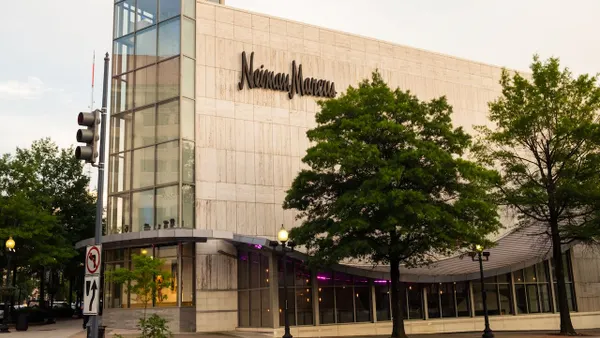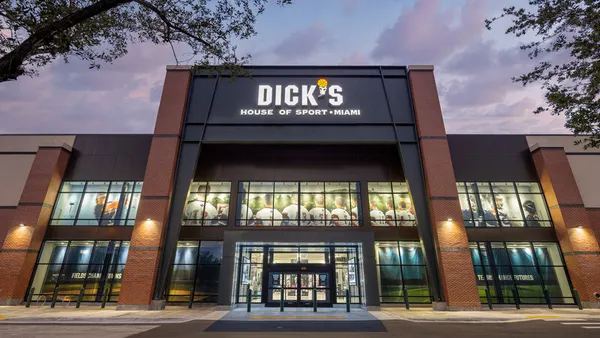Dive Brief:
- GameStop plans to close 400 to 450 stores globally this fiscal year, CFO Jim Bell told analysts Wednesday, according to a Seeking Alpha transcript. That represents more than 100 additional closures for the year previously indicated by executives.
- The year's total includes a net closure of 206 stores in the second quarter, which left GameStop with a footprint 10% smaller compared to Q2 2019. Those store closures contributed to a 26.7% drop in net sales, to $942 million, during Q2, according to a press release.
- GameStop said that 40% of closed store sales were "recaptured" through online sales and nearby physical stores, which in turn led to improved cash flow. Globally, digital sales surged by 800% in Q2, according to the company.
Dive Insight:
The pandemic has brought volatility for GameStop. Early on after COVID-19's spread in the U.S. became apparent, the retailer said it had experienced sales increases as consumers, stuck at home for entertainment as well as education and work, shopped more from the company. But it ended its first quarter with comparable sales down overall.
The retailer responded to store closures with curbside service, which helped boost e-commerce sales. Indeed, digital sales have exploded this year, rising more 500% in Q1 followed by the 800% increase in Q2. That number pushed e-commerce penetration to 20% of GameStop's net sales in Q2.
But those stellar numbers haven't been enough to salvage GameStop's overall sales. In Q2, comparable sales (which includes digital sales) fell 12.7%, which was ahead of the company's expectations, CEO George Sherman said on the analyst call. He added that the pandemic had put strains on the company's supply chain as well, limiting its access to new hardware and accessories.
2020 was always going to be a difficult year for the retailer, as it — and consumers — wait for the next generation of gaming consoles. That means consumers are pulling back on current purchases and all eyes are on Q4, when the next generation Xbox and PlayStation consoles launch.
Jefferies analysts led by Stephanie Wissink said in an emailed note that GameStop "has clear advantages as a destination for gamers but it's still somewhat unclear how the company will benefit from that role financially in the next-gen console cycle." Success for the retailer means taking advantage of its "domain expertise," the analysts said, adding that maintaining relevance and pushing growth requires GameStop to tap into "next-gen digital, e-sports, adjacent gaming forms, & content tied revenue streams."
In the meantime, GameStop aims to cut costs and shrink its massive store portfolio, which at the end of Q2 stood at 5,122 stores globally, according to Bell. The transfer of sales to other channels and rapid expansion of digital sales have boosted management's confidence in its plans.
"Our e-commerce growth has been a major development for GameStop, accelerating our strategic objective to create a frictionless digital ecosystem by several years," Sherman said. "As the pandemic shutdowns began, we quickly recognized that we are seeing a dramatic shift towards e-commerce and that this represented an historic opportunity."














